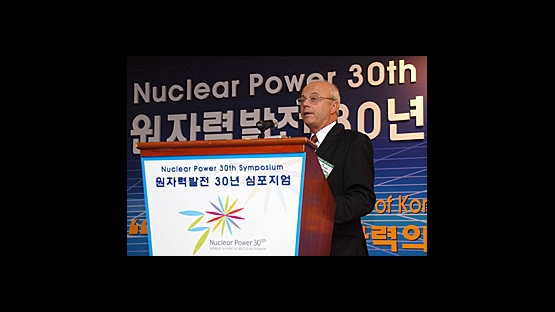The number of nuclear power reactors around the globe is estimated to increase up to 60% by 2030, said Mr. Yury A. Sokolov, Head of the Department of Nuclear Energy and Deputy Director General of the IAEA, at an industry event in Korea. He also remarked that the experience gained over the past decades in energy planning for sustainable development, as well as in the construction, commissioning, operation and maintenance of nuclear power plants will be crucial to help newcomers in the nuclear field.
The global nuclear power industry, however, must find convincing answers to the challenges posed by future development in order to contribute to the world's energy supply mix in the long term, Mr. Sokolov added. Such challenges include:
- Sustainability of uranium resources;
- Safety and economics;
- Waste management and the fuel cycle;
- Public acceptance;
- Human resources and knowledge transfer;
- Development of industrial capacity;
- Integration of newcomers in the nuclear field;
- Assurance of technology and material; and
- Non-proliferation.
"The way in which nuclear power has developed in Korea is a clear demonstration of how the challenges can become opportunities," he said.
Mr. Sokolov´s remarks were made at a ceremony marking the 30th anniversary of nuclear power generation in the Republic of Korea, held on 9 June in Seoul. More than 500 participants from the nuclear industry, technical support organizations as well as international experts joined the event organized by the Korea Hydro & Nuclear Power Co. Ltd (KHNP).
At the ceremony, the need for Korea to build additional nuclear power facilities was highlighted by Kim Jin-woo, who heads the electricity and gas division at the Korea Energy Economics Institute´s Energy Policy Research Group. Mr. Kim said that the country must dramatically increase its proportion of electricity generated by nuclear power in order to keep pace with the global trend of reducing carbon dioxide emissions and deal with record-breaking oil prices.
Background
Nuclear power was first used to generate electricity in Korea in 1978, when the Kori Unit 1 first came online. The country now has 20 units in operation, 6 units under construction and 2 units in planning stages.
According to figures released by the Korea Hydro and Nuclear Power company, over the last 30 years in Korea nuclear power has generated a total of 2 trillion kW/h of electricity, saving the Asian country an estimated 702 million tons of bituminous coal valued at 27 trillion won ($26 billion) or 2.94 billion barrel of heavy oil worth 97 trillion won ($96 billion).


